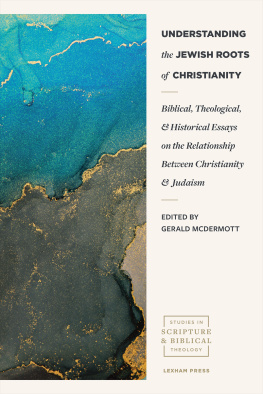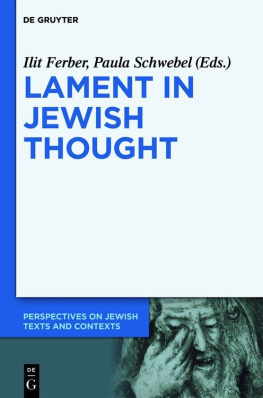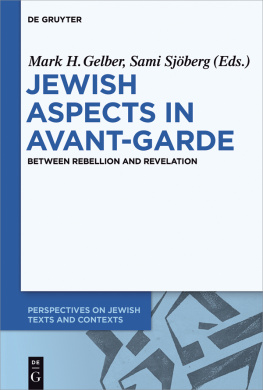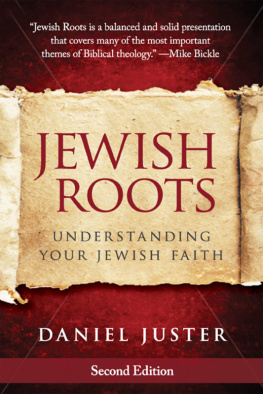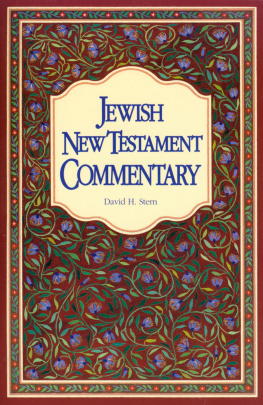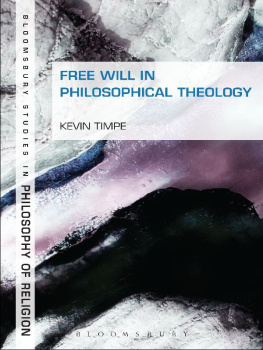C ONTEMPLATIVE NATION
A Philosophical Account of Jewish Theological Language
Cass Fisher
STANFORD UNIVERSITY PRESS
STANFORD, CALIFORNIA
Stanford University Press
Stanford, California
2012 by the Board of Trustees of the Leland Stanford Junior University. All rights reserved.
This book has been published with the assistance of the College of Arts and Sciences, University of South Florida.
Published with the assistance of the Edgar M. Kahn Memorial Fund.
No part of this book may be reproduced or transmitted in any form or by any means, electronic or mechanical, including photocopying and recording, or in any information storage or retrieval system without the prior written permission of Stanford University Press.
Printed in the United States of America on acid-free, archival-quality paper
Library of Congress Cataloging-in-Publication Data
Fisher, Cass, 1968- author.
Contemplative nation : a philosophical account of Jewish theological language / Cass Fisher. pages cm
Includes bibliographical references and index.
ISBN 978-0-8047-7664-6 (cloth : alk. paper)
ISBN 978-0-8047-8100-8 (e-book)
1. Judaism--Doctrines. 2. Philosophical theology. 3. Judaism and philosophy. I. Title. BM602.F574 2012
| 296.301'4--dc23 | 2011049960 |
Typeset by Bruce Lundquist in 11/15 Bembo
t. Horayot 2:5
For my mother, Bonnie Fisher
Contents
Acknowledgments
This project has been long in the making and I have been extremely fortunate to have excellent teachers and friends to guide me through its development. At the earliest stages, it was Frederick Sontag, John Hick, and Charles Zeltzer who set me on a path that has afforded me the luxury to spend my days reflecting on and nurturing my deepest commitments. Without their support and encouragement this work would not have materialized. My debt of gratitude to Michael Fishbane and Paul Mendes-Flohr is truly beyond words. They both introduced me to riches within the Jewish tradition that have had a profound impact on my academic and personal life. I hope that my research and my teaching will always provide testimony to the formative influence they have had on me. I have attempted to document my debt to them in the notes of this work, but that is only a pale reflection of what I owe to them intellectually and otherwise. I should make clear that although they have profoundly shaped my engagement with rabbinic Judaism and modern Jewish thought, my expression of the philosophical problems associated with Jewish theology and my efforts to address those issues are my own. I take full responsibility for any shortcomings that might be found in my argument. Paul Griffiths and David Tracy also provided guidance and intellectual resources that were pivotal to the development of my project. Without their help I would have been unable to bring the threads of my argument together. I sincerely appreciate their interest in my work and the generosity with which they shared their time with me.
I was also fortunate to have many colleagues who helped me bring Contemplative Nation to fruition. I would like to particularly thank John Knight and Bill Wright, who read the work in its entirety, and Jamie Schillinger, who discussed most of its major points. Jerome Copulsky, Leah Hochman, Timothy Sandoval, and Ben Sax were important interlocutors who provided significant counterarguments that surely strengthened the work. Since moving to Tampa, Rabbi Marc Sack has done an admirable job of filling in for all of them. In the final stages of the work, I benefitted from the critiques and support of two senior colleagues, Yehuda Gellman and Norbert Samuelson. True to the philosophical spirit which they both embody, they each had suggestions about how to improve my argument. I attempted to heed their advice as much as possible. I hope it will be evident to both of them that Contemplative Nation is a better book as a result of their comments.
Sections of appeared in Modern Judaism 31, no. 2 (2011): 188212, as Divine Perfections at the Center of the Star: Reassessing Rosenzweigs Theological Language. I would like to thank the Journal of Religion, Peter Lang, and Modern Judaism for allowing me to reprint those materials here.
In writing Contemplative Nation, I have been the recipient of not only intellectual generosity but of considerable financial generosity as well. The Charlotte W. Newcombe Foundation and the Henry Luce Fellowship provided the initial funding that has made this book possible. The Wabash Center offered financial and moral support that helped bring the project to its conclusion. I cherish the friendships that have arisen from my involvement with the Wabash Center, and I am certain that I am a better teacher and researcher as a result of those relationships. I am also grateful for having had the opportunity to participate in the Early Career Workshop of the American Academy of Jewish Research. The facilitators and participants of the AAJR workshop brought critical reflections to my work that enabled me to put the finishing touches on this book. I am delighted to have developed a cohort of colleagues working in the field and I look forward to our ongoing conversations. Without the generous grants awarded to me by the College of Arts and Sciences and the Humanities Institute at the University of South Florida, I would not have been able to complete the manuscript. I would also like to thank Emily-Jane Cohen at Stanford University Press, whose enthusiasm for the project helped to propel me through the final stages of writing.
Finally, I would like to thank my wife, Mariana Fisher, who has accompanied me on a journey that has been more tumultuous and more fun than either of us could have anticipated. I cannot imagine having followed this path without her insight, humor, and support. I look forward to sharing with her the tinge of normalcy that should be the fruit of completing the book.
I NTRODUCTION
Over the last several decades, Jewish studies has evolved into a thriving discipline that explores every facet of Jewish history, culture, and religion. Despite the astounding growth of the field, one crucial subject still has not found its place within Jewish studies: theology. The reluctance of scholars to establish Jewish theology as an academic subject mirrors not only the long-standing debates about the place of theology within the University, but also the contested role of theology within Jewish religious life. As for the larger disciplinary questions, it seems the battle between religious studies and theology has peaked and there are signs that theology is recovering its position within academia. Even if this optimistic reading about the future of academic theology is correct, there is little reason to believe that Jewish theology will benefit from the fragile truce between religious studies and theology. The forces within both Judaism and Jewish studies that have marginalized theology are so numerous and powerful, unless they are either confronted or circumvented theology will remain a tangential subject within the academic study of Judaism. For many scholars, this is well and good, either because they think theology has not been an integral part of the Jewish tradition or because they fear that the study of Jewish theology will diminish Jewish studies hard-won academic credentials. The claim that Judaism does not engage in theology is tendentious and relies upon the truisms that Judaism does not have a single universally accepted theology and that Jewish thought about God does not possess the same features as other theological traditions. Such arguments conceal the fact that Jewish practitioners have endeavored at every stage of the tradition to set forth their best understanding of God and the divine-human relationship. Those who would deny theologys place in Jewish studies on academic grounds are equally misguided. If the goal of Jewish studies is to deploy the analytic tools of the academy to better understand Jewish history, culture, and religion, it makes little sense to bracket on principle a central cognitive component. Furthermore, we can hardly hope to give a full and accurate account of the vicissitudes of Jewish history or the dynamics of Jewish life and practice without taking into consideration the matter of Jewish beliefs.
Next page

